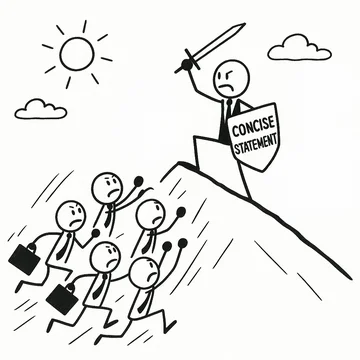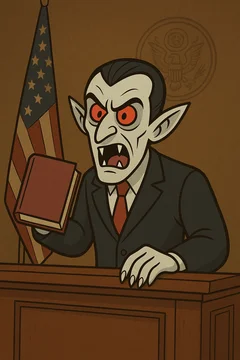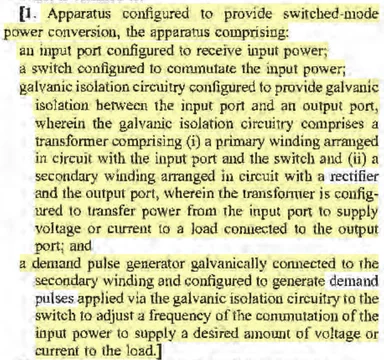
There is probably no more common desire than the ability to go back in time to correct one's mistakes. To use examples from the fascinating life of Jeff Goldblum, you could:
- Decline that invitation to the trial run of a dinosaur themed amusement park
- Check your laboratory for bugs before experimenting with teleportation, or alternatively, hire an assistant
- Suggest someone else lead the pod people away so the group can escape. Ideally, this person would be a bit faster than you.
Most lawyers are bound by more mundane hopes. The job is riddled with tiny-seeming pitfalls with potentially disastrous consequences. Every time you fall into one, you wish you could just call a mulligan and fix it.
This brings me to a motion to "Conform Previously Submitted Evidence to F.R.C.P. Rule 56(c)(4)" that Judge Williams ruled on yesterday, which should give some hope to all of us.
At issue in EIS Inc. v. IntiHealth Ger GmbH, C.A. No. 19-1227-GBW (D. Del. Aug. 30, 2023) (Oral Order) was an expert report submitted with the Plaintiff's opposition to a summary judgment motion. The report was signed, but was not notarized (as an affidavit would be) and lacked the language of the Unsworn Declaration Statute:
I declare (or certify, verify, or state) under penalty of perjury under the laws of the United States of America that the foregoing is true and correct.
28 U.S. Code § 1746.
In its reply statement of fact, the defendant repeatedly referred to the report as "unsworn"--clearly evoking Rule 56(c)(4):
An affidavit or declaration used to support or oppose a motion must be made on personal knowledge, set out facts that would be admissible in evidence, and show that the affiant or declarant is competent to testify on the matters stated.
Plaintiff then filed the above-mentioned motion to "conform," seeking to file a new declaration from the expert that simply adopted her report and adding in the language of § 1746. Judge Williams granted the motion, citing Pennypack:
in order for an expert report to be considered during the summary judgment phase, it must either include a formal affidavit, or be sworn to under penalty of perjury in compliance with Rule 56(c)(4) of the Federal Rules of Civil Procedure . . . A party has a duty to supplement its expert report in a timely manner when the party obtains additional information or learns that in some material respect the disclosure or response is "incomplete or incorrect." Fed. R. Civ. P. 26(e)(1)(A). Courts may permit supplementation of expert reports past the Rule 26(e) deadline pursuant to Fed. R. of Civ P. 37(c), if the failure to disclose the supplementation was substantially justified or harmless. To determine whether a failure to disclose was harmless, courts in the Third Circuit consider the Pennypack factors . . . Here, the Pennypack factors weigh in favor of granting leave . . . There is no evidence that Novoluto would be prejudiced by this supplementation, nor is there any dispute that ensuring Ms. Bakalova's report conforms with Rule 56(c)(4) of the Federal Rules of Civil Procedure is important to EIS's Opposition to Novoluto's Summary Judgment of IPR Estoppel.
EIS Inc. v. IntiHealth Ger GmbH, C.A. No. 19-1227-GBW (D. Del. Aug. 30, 2023) (Oral Order).
From my travels, I happen to know of one other case where this issue arose in a slightly different procedural posture with the same ultimate result. INVISTA North America S.a.r.l. v. M&G USA Corp., C.A. No. 11-1007-SLR-CJB (D. Del. June 25, 2013) (Mem. Op.), had essentially the same fact pattern with the plaintiff attaching a report that lacked the "penalty of perjury" language and defendant complaining in their response that this report couldn't support an SJ motion.
Rather than filing a motion to conform (or anything similar) the plaintiff just filed a new declaration a few days later. Judge Robinson held that this was sufficient:
In its combined surreply and reply brief on summary judgment of infringement, M&G argues that lnvista failed to provide any admissible expert testimony . . . Because Dr. Turner's expert reports were unsworn. In Fowle v. C & C Cola, 868 F.2d59, 67 (3d Cir. 1989), the Third Circuit found an unsworn expert report to be inadmissible on summary judgment for not complying with Federal Rule of Civil Procedure 56. The Court cautioned that "evidence should not be excluded on summary judgment on hypertechnical grounds" but emphasized that the plaintiff in that case "did nothing to correct the error before [the district court]." Here, lnvista has corrected the error- Dr. Turner filed a declaration on April 18, 2013, affirming that his opening and rebuttal reports, in their entirety, were made under oath. (D. I. 319)
INVISTA North America S.a.r.l. v. M&G USA Corp., C.A. No. 11-1007-SLR-CJB, 17 n.6 (D. Del. June 25, 2013) (Mem. Op.).
So there you go, sometimes you get a second chance to make things right. Just try not to need it toooooo often.
P.S.
If you got the reference in the title, congratulations on becoming old. Stop by my office for a free travel-sized bottle of advil and a discussion about why everything is so darned expensive nowadays.
If you enjoyed this post, consider subscribing to receive free e-mail updates about new posts.




